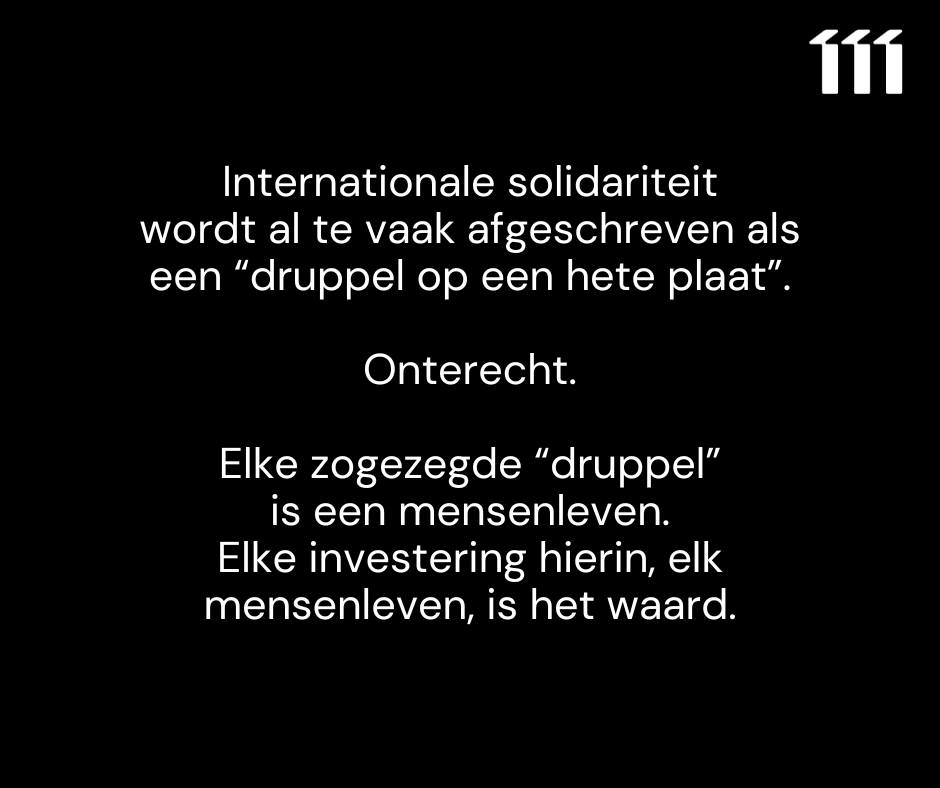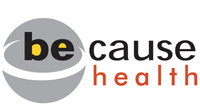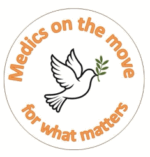
Opinion about proposal to halve Development aid by Els Hertogen (director 11.11.11), Jean Van Wetter (director Enabel), Joris Totté (director BIO), Arnout Justaert (director ngo-federatie), Arnaud Zacharie (director CNCD) and Raphaël Maldague (director Acodev): Investing in defense alone does not guarantee sustainable security, write directors of Belgian aid organizations.
This opinion appeared in the Flemish newspaper De Standaard on 29/08/2024. (paywall)
Attention! This translation has been automatically generated.
Security and prosperity for Belgium and the Belgians starts abroad
“Halving development aid,” we read in this newspaper last weekend, as one of the many ways in which the Arizona coalition wanted to make drastic cuts. In the meantime, this was qualified by reports that some cuts still had to be discussed in depth. For example, it would not be about halving the total development budget, but “only” a part of it.
Nevertheless, the report lifts a sobering tip of the veil on the proposals that are on the negotiating table when it comes to development cooperation. It is about savings. In doing so, the Arizona government is turning its back on a decades-old international promise that gradually more resources for development cooperation would be released to reach 0.7 percent of the Gross National Product. In 2023, we landed at barely 0.4 percent.
Every human life counts
The political choices that are being made now reflect the kind of society we want to be. Solidarity and an open view of the outside world, or staring at our own navel? In our opinion, the latter is not an option.
Because the foreign country has become more domestic than ever. Look at the impact of war, climate crisis or a global pandemic on our own economy and our daily lives. Conversely, our domestic policy has a major impact on the foreign country. For example, our commitment to reducing our own CO₂ emissions also has an impact on global droughts, forest fires, storms and famines.
Belgium is not an island. No matter how small, we have a role to play in the world. From a moral point of view. Because we once agreed – with the Universal Declaration of Human Rights – to always stand up for human rights for everyone. But it is also simply sensible from a strategic point of view. Security and prosperity for Belgium and the Belgians starts abroad. We need strong, sustainable alliances in the world to stand strong as a small country. Especially now that self-interest and the brutal violation of human rights are once again gaining ground internationally, it is all the more important to show that things can and must be done differently. By opting for international cooperation and solidarity. This is not an either-or story, in which we either invest in our own society or in the rest of the world. When we invest in international solidarity, we invest in everyone’s future, including here with us. This is an and-and story.
If you really want to achieve safety and well-being for everyone, you must also dare to invest in tackling the causes of human and economic insecurity. You do this by investing in diplomacy and development cooperation. You cannot guarantee sustainable safety by investing solely in defense. That is a measure of last resort; we must invest in partnerships through diplomacy and development cooperation to avoid war and the use of defense. We in Belgium have been taking on this role for many years. Often with the appreciation of the outside world. The political position on Israel and Gaza, in which every human life counts and international law must be respected, flanked by our – meanwhile severely affected – development cooperation in Gaza, is just one of many examples of this.
Results
Development cooperation is all too often written off as a “drop in the ocean”. Wrongly so. You don’t stop investing in cancer research because we have not yet succeeded in curing and preventing every cancer. You continue to invest in it and research it, because as a society you make the choice to fight for every human life. In this way, every so-called “drop” within development cooperation is a human life. Every investment in it, every human life, is worth it.
The results that development cooperation can present are impressive. Thanks to development cooperation, poverty is reduced, investments are growing and the level of education in the recipient countries is rising. According to UNESCO, 34 million more children have been going to school since the 2000s. Polio has been almost completely eradicated and the number of HIV infections has halved since 2000. Of course, there is an ongoing debate about how to use this development cooperation in such a way that it makes a difference for as many people as possible. But in order to be able to implement a policy, you need resources.
Countless Belgian actors put development cooperation into practice every day, looking for the biggest levers, evolve with the needs and lessons learned. They each have their own way of working, their own experience and expertise and that is precisely why they strengthen each other to tackle poverty and inequality together. Take healthcare. The Belgian government strengthens healthcare systems in partner countries, while NGOs raise awareness among the local population and help them stand up for their right to health. Multilateral organizations conduct vaccination campaigns, while other actors invest in the private sector to promote local production of medical products. Academic partnerships focus on improving the quality of medical training and on innovative research into global and local challenges, such as the development of vaccines. Large humanitarian organizations, but also small-scale citizen initiatives, take action to provide healthcare in precarious crisis situations. All of this saves lives, every day.
Investing in development cooperation is and remains a political choice. Our request is to make that choice not from ideological preconceptions or symbols, but substantiated and with a long-term vision. To implement policy from everyone’s interest. To provide the much-needed resources for this and to fulfill our international commitments.




